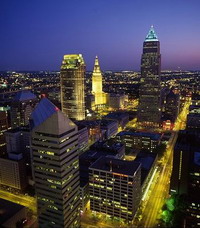Login form
Ohio

Ohio gets its name from the Ohio River, which forms the state’s southern border. The word Ohio means “great river” or “beautiful river” in Algonquian, a Native American language. The Ohio River has been central to the state’s history from the beginning.
Ohio is located in the northeastern United States. It joined the Union on March 1, 1803. Today, Ohio is the seventh most populated state in the nation. About 11 million people live there.
THE BUCKEYE STATE
Ohio is called the Buckeye State because of the many buckeye trees that grew on its rolling hills and plains when settlers arrived. Buckeyes are a kind of chestnut. Settlers used buckeye trees to build the first log cabins in Ohio.
|
Facts About Ohio |
|
|
|
|
|
Capital |
Columbus |
|
Population |
11,400,000 people |
|
Rank among states in population |
7th |
|
Major cities |
Columbus, Cleveland, Cincinnati, Toledo |
|
Area |
44,800 square miles |
|
Rank among states in area |
34th |
|
Statehood |
March 1, 1803, the 17th state |
|
State nickname |
The Buckeye State |
|
Name for residents |
Ohioans |
|
State bird |
Cardinal |
|
State flower |
Red Carnation |
|
State tree |
Ohio Buckeye |
|
Abbreviation |
OH |
The central and western parts of Ohio are mainly flat. Hills rise in the east and along the Ohio River in the south. Rich farmland covers much of western Ohio. Some of Ohio’s biggest forests and most spectacular scenery are in the east.
TRAVELING WEST ON THE OHIO RIVER
The Ohio River forms Ohio’s entire southern border. Farther west, it joins the great Mississippi River. The Ohio was important to the early westward expansion of the United States. By the 1820s, it was the main way settlers and cargo traveled to Indiana, Illinois, and points farther west.
Goods shipped from Ohio also went down the Mississippi to New Orleans and the Gulf of Mexico. Railroads eventually replaced the Ohio as the primary shipping route. But the river is still used for transportation today. You even can still ride paddle-wheel steamboats along the Ohio!
COLUMBUS, CLEVELAND, AND CINCINNATI
The capital of Ohio is Columbus, located near the middle of the state. It’s also the state’s largest city. But both Cleveland and Cincinnati have more people in their metropolitan areas than Columbus.
Cleveland is on the shore of Lake Erie to the north, at the mouth of the Cuyahoga River. Cleveland is Ohio’s second biggest city and its main industrial center. Oceangoing boats use Cleveland’s port to ship goods throughout the world. Ships reach the Atlantic Ocean by way of the St. Lawrence Seaway to the northeast.
Cincinnati grew up along the Ohio River in the southwest. It began as a shipping town, sending goods to the Mississippi and beyond. For a long time, Cincinnati’s main task was to ship coal mined in Ohio, Kentucky, and West Virginia. It was also a major steamboat stop for travelers heading west.
STEEL AND OIL
After the American Civil War ended in 1865, Ohio grew quickly. Its heavy industries expanded, especially steel and steel goods. Ohio’s oil business, led by John D. Rockefeller and his Standard Oil Company, boomed. Railroads connected Ohio’s industries to cities in the east.
These old industries have since declined. But Ohio remains an important manufacturing state.
EARLY FLIGHT
Did you know the airplane was invented in Ohio? Orville and Wilbur Wright, the inventors of the airplane, grew up in Dayton, Ohio. They flew their first airplanes in North Carolina. But they designed and built their early flying machines in their Dayton bicycle shop.
Today, the Dayton Aviation Heritage National Historical Park displays the Wright brothers’ bicycle shop and one of their earliest airplanes.
SPORTING TRADITION
Sports have a long history in Ohio. The Cincinnati Reds are the oldest team in professional baseball. They’ve been playing since 1869 and helped found baseball’s National League in 1876. The Cleveland Indians are one of the original members of the American League, which was organized in 1901.
The National Football League has deep roots in Ohio, too. In 1920, a group of football owners met in Canton, Ohio, to form what would become the National Football League. The first president of the league was the legendary athlete Jim Thorpe, who had played football in the professional Ohio League.
You can learn all about football at the Pro Football Hall of Fame in Canton. It’s a favorite stop for tourists to the state.
ROCK AND ROLL HALL OF FAME
Cleveland is considered important in the history of rock and roll music. In the early 1950s, Cleveland disc jockey Alan Freed helped promote this musical style. Freed is even credited with coining the term “rock ‘n’ roll.”
In 1995, Cleveland celebrated the opening of the Rock and Roll Hall of Fame and Museum. The museum pays tribute to musicians and others who have helped shape rock music.
Source: Microsoft ® Encarta

